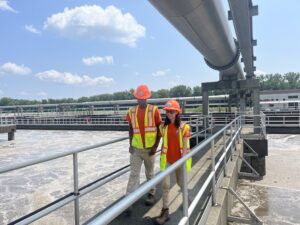Who is a member?
Our members are the local governments of Massachusetts and their elected and appointed leadership.

Pipeline Program interns from the 2023 cohort tour the secondary treatment aeration basins at the Springfield Regional Wastewater Treatment Facility on Bondi’s Island in Agawam. (Photo courtesy Springfield Water and Sewer Commission)
As its industry faces widespread hiring and staffing challenges, the Springfield Water and Sewer Commission hopes that a high school internship program will help attract the next generation of water sector employees.
Last year, the commission established the Pipeline Program (pun intended), an eight-week paid summer internship for Springfield high school students to learn about water-sector careers. The commission is again accepting applications for the summer program, which represents a partnership with the Springfield Public Schools, the Massachusetts Water Works Association, and the wastewater operator Veolia. The commission hopes that the work-based learning experience will convince students to consider a future in water.
“A lot of water infrastructure is out of sight, out of mind, so people don’t always think about those types of jobs or the breadth of all the different careers in the water sector,” said Katherine Shea, the commission’s educational outreach manager. “So in thinking about how we could increase that awareness and give young people a little bit more exposure to the different careers in the water sector, we came up with the idea of giving internships to high school students.”
Like many government-related industries, the water sector has experienced hiring challenges. Shea said Springfield’s commission, which operates independently from the city and has about 250 employees, was responding to the waves of retirements statewide and the struggle to hire in western Massachusetts, where a smaller labor pool stretches out across a larger geographic area. Many of the technical positions also require additional education and licenses, and the commission will need additional qualified staff to run a new drinking-water plant it is building.
Given the critical importance of water-related services, officials have voiced support for efforts to build a workforce pipeline.
“Our public health, our quality of life, and our economy depend on the hardworking people that keep our taps flowing, our environment clean, and our fire hydrants at the ready,” Springfield Mayor Domenic Sarno said last year in a statement about the program.
The program is open to students who are at least 16 years old, and are in grades 10 through 12. The students receive $15 an hour, and work 32-hour weeks. From about 45 applications last year, the commission selected 12 students from five of Springfield’s high schools.
The student interns rotate through several departments, learning about topics including engineering, watershed protection, wastewater operations, drinking water operations, laboratory services and water quality, field services, and information technology and cybersecurity. Last year, the students also received mentoring and visited neighboring municipal departments, as well as UMass Amherst and Westfield State University.
The program also features a course, “Introduction to Becoming a Public Water System Operator,” which enables students to take the state Treatment 1 licensing exam, a first-step level.
The commission has paid for the program through its education and workforce development programming and with a contribution from Veolia. Shea said that smaller utilities and municipal departments could easily replicate the program on a smaller scale.
The commission is talking with other local entities about referring interns for internships or roles, she said, and about the possibility of building a network.
By mid-February, the commission had 40 applications for this summer’s 12 spots, Shea said, with the deadline still nearly two months away. Given that most of last year’s students are still in high school, it will likely take a few years for the effort to show results in its workforce.
“Now these 12 interns are out in the community, and they’re telling their friends and their family and their neighbors, and all that,” Shea said. “I think it’s definitely helping across the city to raise awareness of our water system.”